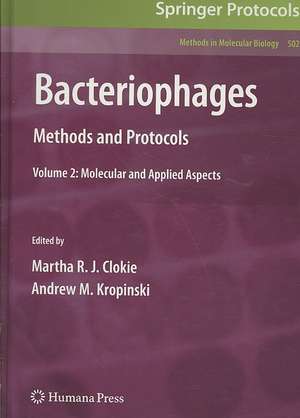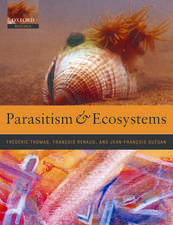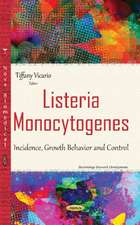Bacteriophages: Methods and Protocols, Volume 2: Molecular and Applied Aspects: Methods in Molecular Biology, cartea 502
Editat de Martha R. J. Clokie, Andrew Kropinskien Limba Engleză Hardback – 15 dec 2008
Thorough and cutting-edge, Bacteriophages: Methods and Protocols is a valuable reference for experienced bacteriophage researchers as well as an easily accessible introduction for newcomers to the subject.
| Toate formatele și edițiile | Preț | Express |
|---|---|---|
| Paperback (2) | 855.83 lei 38-44 zile | |
| Humana Press Inc. – 19 noi 2010 | 855.83 lei 38-44 zile | |
| Humana Press Inc. – 19 noi 2010 | 1329.31 lei 43-57 zile | |
| Hardback (2) | 1160.84 lei 38-44 zile | |
| Humana Press Inc. – 18 dec 2008 | 1160.84 lei 38-44 zile | |
| Humana Press Inc. – 15 dec 2008 | 1561.36 lei 43-57 zile |
Din seria Methods in Molecular Biology
- 9%
 Preț: 791.59 lei
Preț: 791.59 lei - 23%
 Preț: 598.56 lei
Preț: 598.56 lei - 20%
 Preț: 882.95 lei
Preț: 882.95 lei -
 Preț: 252.04 lei
Preț: 252.04 lei - 5%
 Preț: 729.61 lei
Preț: 729.61 lei - 5%
 Preț: 731.43 lei
Preț: 731.43 lei - 5%
 Preț: 741.30 lei
Preț: 741.30 lei - 5%
 Preț: 747.16 lei
Preț: 747.16 lei - 15%
 Preț: 663.45 lei
Preț: 663.45 lei - 18%
 Preț: 1025.34 lei
Preț: 1025.34 lei - 5%
 Preț: 734.57 lei
Preț: 734.57 lei - 18%
 Preț: 914.20 lei
Preț: 914.20 lei - 15%
 Preț: 664.61 lei
Preț: 664.61 lei - 15%
 Preț: 654.12 lei
Preț: 654.12 lei - 18%
 Preț: 1414.74 lei
Preț: 1414.74 lei - 5%
 Preț: 742.60 lei
Preț: 742.60 lei - 20%
 Preț: 821.63 lei
Preț: 821.63 lei - 18%
 Preț: 972.30 lei
Preț: 972.30 lei - 15%
 Preț: 660.49 lei
Preț: 660.49 lei - 5%
 Preț: 738.41 lei
Preț: 738.41 lei - 18%
 Preț: 984.92 lei
Preț: 984.92 lei - 5%
 Preț: 733.29 lei
Preț: 733.29 lei -
 Preț: 392.58 lei
Preț: 392.58 lei - 5%
 Preț: 746.26 lei
Preț: 746.26 lei - 18%
 Preț: 962.66 lei
Preț: 962.66 lei - 23%
 Preț: 860.21 lei
Preț: 860.21 lei - 15%
 Preț: 652.64 lei
Preț: 652.64 lei - 5%
 Preț: 1055.50 lei
Preț: 1055.50 lei - 23%
 Preț: 883.85 lei
Preț: 883.85 lei - 19%
 Preț: 491.88 lei
Preț: 491.88 lei - 5%
 Preț: 1038.84 lei
Preț: 1038.84 lei - 5%
 Preț: 524.15 lei
Preț: 524.15 lei - 18%
 Preț: 2122.34 lei
Preț: 2122.34 lei - 5%
 Preț: 1299.23 lei
Preț: 1299.23 lei - 5%
 Preț: 1339.10 lei
Preț: 1339.10 lei - 18%
 Preț: 1390.26 lei
Preț: 1390.26 lei - 18%
 Preț: 1395.63 lei
Preț: 1395.63 lei - 18%
 Preț: 1129.65 lei
Preț: 1129.65 lei - 18%
 Preț: 1408.26 lei
Preț: 1408.26 lei - 18%
 Preț: 1124.92 lei
Preț: 1124.92 lei - 18%
 Preț: 966.27 lei
Preț: 966.27 lei - 5%
 Preț: 1299.99 lei
Preț: 1299.99 lei - 5%
 Preț: 1108.51 lei
Preț: 1108.51 lei - 5%
 Preț: 983.72 lei
Preț: 983.72 lei - 5%
 Preț: 728.16 lei
Preț: 728.16 lei - 18%
 Preț: 1118.62 lei
Preț: 1118.62 lei - 18%
 Preț: 955.25 lei
Preț: 955.25 lei - 5%
 Preț: 1035.60 lei
Preț: 1035.60 lei - 18%
 Preț: 1400.35 lei
Preț: 1400.35 lei - 20%
 Preț: 817.30 lei
Preț: 817.30 lei
Preț: 1561.36 lei
Preț vechi: 1904.10 lei
-18% Nou
Puncte Express: 2342
Preț estimativ în valută:
298.79€ • 310.06$ • 249.75£
298.79€ • 310.06$ • 249.75£
Carte tipărită la comandă
Livrare economică 17-31 martie
Preluare comenzi: 021 569.72.76
Specificații
ISBN-13: 9781603275644
ISBN-10: 1603275649
Pagini: 373
Ilustrații: XXII, 373 p.
Dimensiuni: 203 x 276 x 23 mm
Greutate: 0.93 kg
Ediția:2009
Editura: Humana Press Inc.
Colecția Humana
Seria Methods in Molecular Biology
Locul publicării:Totowa, NJ, United States
ISBN-10: 1603275649
Pagini: 373
Ilustrații: XXII, 373 p.
Dimensiuni: 203 x 276 x 23 mm
Greutate: 0.93 kg
Ediția:2009
Editura: Humana Press Inc.
Colecția Humana
Seria Methods in Molecular Biology
Locul publicării:Totowa, NJ, United States
Public țintă
Professional/practitionerCuprins
Bacteriophage Genomics.- Preparation of Bacteriophage Lysates and Pure DNA.- Approaches to the Compositional Analysis of DNA.- Determination of Bacteriophage Genome Size by Pulsed-Field Gel Electrophoresis.- Preparation of a Phage DNA Fragment Library for Whole Genome Shotgun Sequencing.- PCR and Partial Sequencing of Bacteriophage Genomes.- In Sffamily Identification of Genes in Bacteriophage DNA.- Determining DNA Packaging Strategy by Analysis of the Termini of the Chromosomes in Tailed-Bacteriophage Virions.- In silico Characterization of DNA Motifs with Particular Reference to Promoters and Terminators.- Molecular Phylogenetics: Testing Evolutionary Hypotheses.- Bacteriophage Transcriptomics and Proteomics.- Preparation of RNA from Bacteria Infected with Bacteriophages: A Case Study from the Marine Unicellular Synechococcus sp. WH7803 Infected by Phage S-PM2.- Quantification of Host and Phage mRNA Expression During Infection Using Real-Time PCR.- Oligonucleotide Microarrays for Bacteriophage Expression Studies.- Purification of Bacteriophages and SDS-PAGE Analysis of Phage Structural Proteins from Ghost Particles.- Phage Proteomics: Applications of Mass Spectrometry.- Community Bacteriophage Approaches.- Isolation Independent Methods of Characterizing Phage Communities 1: Strain Typing Using Fingerprinting Methods.- Isolation Independent Methods of Characterizing Phage Communities 2: Characterizing a Metagenome.- Applied Aspects Of Bacteriophage Biology.- Phage Typing.- A Genetic Screen to Identify Bacteriophage Lysins.- General M13 Phage Display: M13 Phage Display in Identification and Characterization of Protein–Protein Interactions.- Isolation of Monoclonal Antibody Fragments from Phage Display Libraries.- Internet Resources of Interest to BacteriophageWorkers.
Textul de pe ultima copertă
Ranging from the evolution of pathogenicity to oceanic carbon cycling, the many and varied roles that bacteriophages play in microbial ecology and evolution have inspired increased interest within the scientific community. Bacteriophages: Methods and Protocols pulls together the vast body of knowledge and expertise from top international bacteriophage researchers to provide both classical and state-of-the-art molecular techniques. With its well-organized modular design, Volume 2: Molecular and Applied Aspects examines a multitude of topics, including the bacteriophage genomics, metagenomics, transcriptomics, and proteomics, along with applied bacteriophage biology. Written in the highly successful Methods in Molecular Biology™ series format, chapters consist of brief introductions to the subject, lists of the necessary materials and reagents, readily reproducible laboratory protocols, and a Notes section which details tips on troubleshooting and avoiding known pitfalls.
Thorough and cutting-edge, Bacteriophages: Methods and Protocols is a valuable reference for experienced bacteriophage researchers as well as an easily accessible introduction for newcomers to the subject.
Thorough and cutting-edge, Bacteriophages: Methods and Protocols is a valuable reference for experienced bacteriophage researchers as well as an easily accessible introduction for newcomers to the subject.
Caracteristici
Examines tried-and-true methods along with the most cutting-edge protocols Ideal for both professionals and newcomers due to convenient, easy-to-use style Designed for modular use, providing a potential wide array of techniques based on the combination of the methods described
Recenzii
From the reviews:
"This book apart from the numerous texts recently published in the area of bacteriophage biology is the focus on the methodology used in this field. … This volume focuses largely on the classical protocols - as described by the editors … . This book should prove to be a valuable resource to even the experienced phage biologist and an essential reference book for postgraduate students and scientists new to the field of phage biology." (Sophie Foley, Microbiology Today, July, 2009)
"This book apart from the numerous texts recently published in the area of bacteriophage biology is the focus on the methodology used in this field. … This volume focuses largely on the classical protocols - as described by the editors … . This book should prove to be a valuable resource to even the experienced phage biologist and an essential reference book for postgraduate students and scientists new to the field of phage biology." (Sophie Foley, Microbiology Today, July, 2009)











